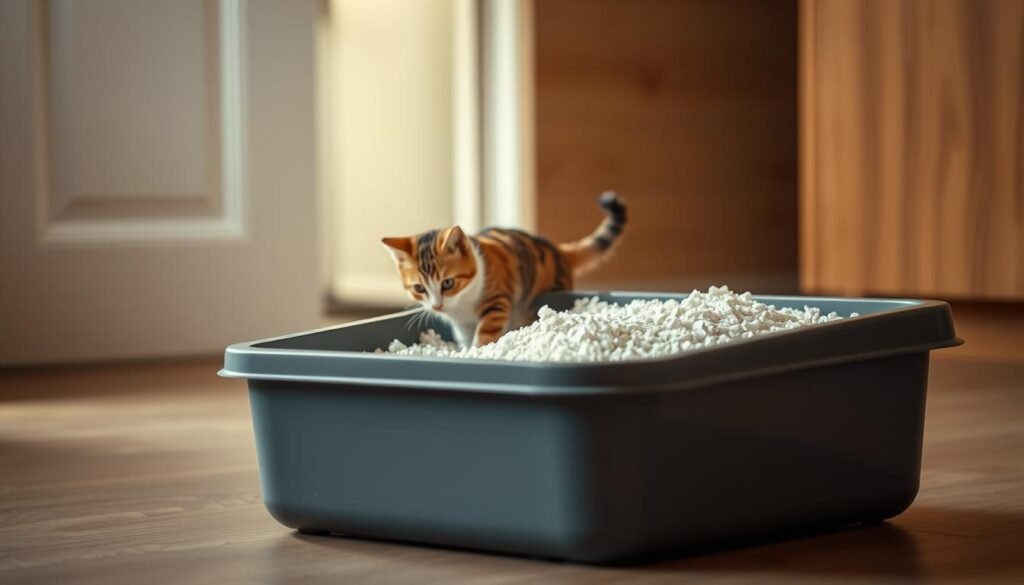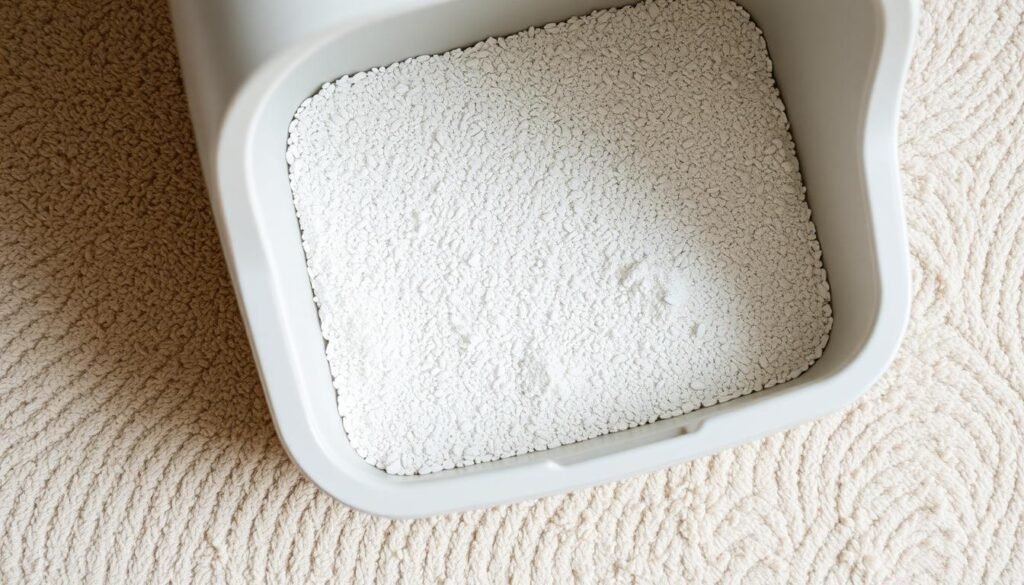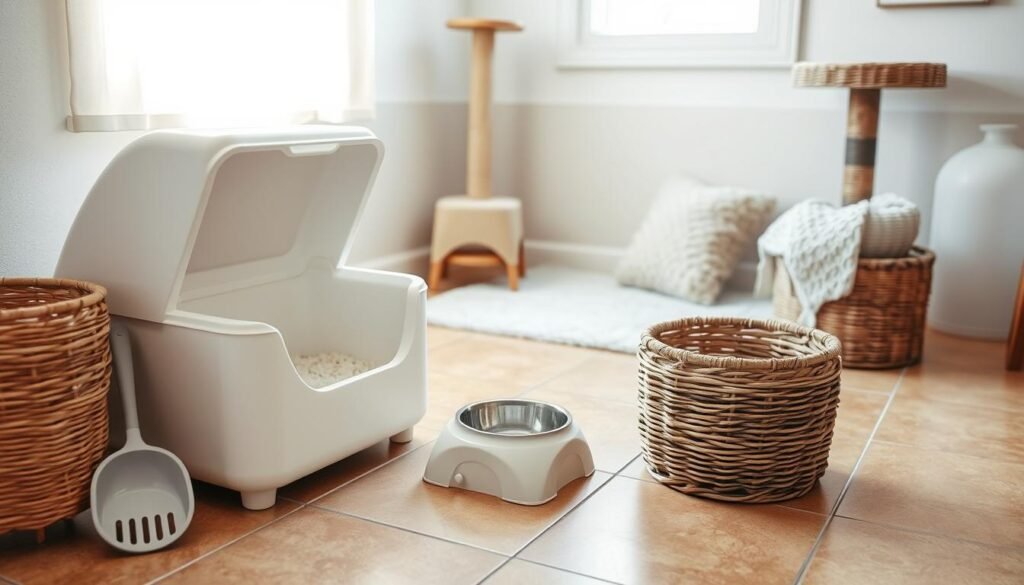
As a cat owner, I’ve learned that maintaining a clean litter box is crucial for our feline friends. Cats are naturally meticulous creatures, spending a significant amount of time each day grooming themselves. This innate tidiness extends to their litter boxes—they expect them to be spotless.
A dirty litter box can lead your cat to seek alternative spots to eliminate, which can create problems in your home. This behavior isn’t just about territory marking; it’s often a sign of discomfort or stress caused by an unclean environment.
In the wild, cats bury their waste to avoid attracting predators, a habit they bring into domestic life. A clean litter box honors this natural instinct, reducing the likelihood of spraying or inappropriate elimination.
According to the Cat Spray Stop Review, keeping the litter box clean is one of the most effective ways to prevent spraying. Veterinary experts recommend daily scooping and regular changes of litter to maintain a hygienic environment.
Ignoring this simple maintenance can lead to health issues and unpleasant odors, making your home less comfortable for both you and your cat. By prioritizing litter box cleanliness, you create a healthier, happier space for your pet.

Key Takeaways
- Cats are naturally clean animals and expect their litter boxes to be maintained.
- A dirty litter box can lead to spraying or elimination in inappropriate places.
- Wild instincts drive cats to bury waste, a behavior they retain in domestic settings.
- Daily cleaning and regular litter changes are vital for preventing spraying.
- Ignoring litter box maintenance can result in health issues and unpleasant odors.
- A clean litter box contributes to a healthier, more comfortable home environment.
Understanding Why Cats Demand a Clean Litter Box
Understanding why cats demand a clean litter box starts with their natural instincts. Cats are meticulous animals, and their litter box habits reflect this trait. In the wild, cats bury their waste to avoid detection by predators, a behavior they carry into domestic life.
How Feline Behavior Drives Cleanliness
Cats associate a clean environment with safety and comfort. A dirty litter box can lead to stress, causing your cat to seek alternative spots to eliminate. This behavior isn’t just about territory marking; it’s often a sign of discomfort or stress caused by an unclean environment.
The Impact of a Dirty Environment on Cat Health and Behavior
A dirty litter box can lead to undesirable elimination behaviors and health issues such as UTIs and kidney infections. According to the Cat Spray Stop Review, keeping the litter box clean is one of the most effective ways to prevent spraying. Veterinary experts recommend daily scooping and regular litter changes to maintain a hygienic environment.
| Health Issues | Behavioral Problems | Prevention Tips |
|---|---|---|
| Urinary Tract Infections (UTIs) | Increased spraying | Daily scooping |
| Kidney Infections | Elimination in inappropriate places | Regular litter changes |
“A clean litter box is essential for preventing spraying and maintaining your cat’s overall health.” – Veterinary Expert
By prioritizing litter box cleanliness, you create a healthier, happier space for your pet. A clean environment keeps both odor and disease risks minimized, ensuring your cat stays healthy and well-behaved.
The Importance of Clean Litter Boxes in Preventing Spraying
Keeping your cat’s litter box clean is essential for maintaining their health and preventing unwanted spraying behavior. Cats are sensitive to their environment, and a dirty litter box can cause significant stress, leading to marking behaviors.

How Unsanitary Conditions Trigger Spraying and Marking
Unsanitary conditions in the litter box can trigger spraying and marking behaviors in cats. According to veterinary experts, a dirty litter box can lead to stress and discomfort, causing your cat to seek alternative places to eliminate. This behavior is not just about territory marking but also a sign of distress.
Expert Tips on Stopping Cat Spray Effectively
Expert recommendations, including those from the Cat Spray Stop Review, emphasize the importance of daily scooping and regular litter changes. Maintaining the correct litter depth and using odor-controlling products can also help. Automated litter boxes, like the Litter-Robot, can simplify cleaning and reduce odor issues.

By prioritizing litter box cleanliness, you can create a healthier environment for your cat, reducing the risk of health issues and unwanted spraying behavior.
Choosing the Right Litter Box Setup for Your Cat
Selecting the right litter box setup is a critical decision for both you and your cat. With so many options available, it’s important to consider your cat’s preferences and your home’s layout.
Open vs. Covered Boxes: Privacy and Odor Control
Open litter boxes offer easy access and visibility, which can be beneficial for monitoring your cat’s health. However, they may not control odors as effectively. Covered boxes, on the other hand, provide privacy and better odor containment but can feel cramped for larger cats.
Considerations for Litter Box Size, Shape, and Placement
The size and shape of the litter box should accommodate your cat comfortably. A box that’s too small can lead to discomfort and spraying. Placement is also key—keep litter boxes away from your cat’s food and water areas to respect their natural instincts.
| Feature | Open Boxes | Covered Boxes |
|---|---|---|
| Privacy | Less private | More private |
| Odor Control | Limited | Better |
| Accessibility | Easier | Depends on size |
According to the Cat Spray Stop Review, the right litter box setup can significantly reduce spraying behavior. By considering your cat’s needs and your home’s dynamics, you can create a comfortable and hygienic environment.

Daily Litter Box Maintenance and Cleaning Tips
Maintaining a clean litter box is essential for your cat’s health and happiness. As a cat owner, I’ve found that establishing a consistent cleaning routine helps prevent odor buildup and keeps my cat coming back to the box.
Best Practices for Daily Scooping and Deep Cleaning
Daily scooping is the cornerstone of litter box maintenance. I recommend scooping at least twice a day to remove waste and clumps. This simple step prevents odors and keeps the litter box inviting for your cat. Every week, take the time to empty the box completely, scrub it with a mild detergent, and refill it with fresh litter. Adding a thin layer of baking soda at the bottom can help absorb any lingering smells.
Utilizing Self-Cleaning Litter Boxes and Efficient Tools
To make maintenance easier, consider using self-cleaning litter boxes like the Litter-Robot 4. These automated systems scoop out waste soon after your cat leaves the box, reducing odor and mess. Additionally, invest in a good-quality scoop and a litter mat to catch stray particles. These tools can make your cleaning routine more efficient and less stressful.
| Tool | Benefit | Frequency of Use |
|---|---|---|
| Durable Litter Scoop | Efficiently removes clumps and waste | Daily |
| Litter Mat | Catches stray litter particles | Daily |
| Self-Cleaning Litter Box | Automates waste removal | Continuous |
By following these tips and using the right tools, you can keep your cat’s litter box clean and hygienic, ensuring a happy and healthy environment for your pet.

Conclusion
Maintaining a clean litter box is vital for your cat’s health and behavior. As outlined in the Cat Spray Stop Review, daily scooping and regular litter changes can prevent spraying and marking behaviors. A hygienic environment reduces the risk of health issues like UTIs and kidney infections, ensuring your cat stays comfortable and well-behaved.
Expert tips emphasize the importance of consistency in cleaning routines. Tools like self-cleaning litter boxes and odor-controlling products can simplify maintenance. By prioritizing your cat’s litter box cleanliness, you create a healthier home environment that benefits both you and your pet.
In conclusion, a clean litter box is more than just a convenience—it’s essential for your cat’s overall well-being. Following these guidelines has positively impacted my experience as a cat owner, and I encourage you to apply these practices to ensure your pet’s health and happiness.
FAQ
How often should I clean my cat’s litter box?
I recommend cleaning your cat’s litter box daily to remove waste and clumps. This helps reduce odor and keeps your cat healthy. Deep cleaning once a week is also a good idea to maintain a fresh environment.
Why does my cat avoid the litter box?
Cats may avoid the litter box due to health issues like kidney disease or discomfort. Stress or dissatisfaction with the litter box’s location or type can also cause avoidance. Consulting a vet is a good step to rule out medical problems.
How many litter boxes should I have per cat?
It’s best to have one more litter box than the number of cats in your home. For example, two cats should have three litter boxes. This reduces competition and stress.
Can I leave my cat’s litter box in the kitchen?
Placing the litter box in a quiet, private area is ideal. Avoid high-traffic zones like the kitchen to ensure your cat feels comfortable using it without disturbances.
What type of litter is best for odor control?
Clumping clay litter is effective for odor control as it traps smells and makes scooping easier. However, some cats prefer silica or natural litters, so it’s worth trying different types to find what works best for your cat.
How can I prevent my cat from spraying outside the litter box?
Ensuring the litter box is clean and in a quiet spot can help. If spraying persists, it may indicate a medical issue, so consulting a vet is advisable to check for underlying health problems.
Can my cat share a litter box with another pet?
Cats prefer having their own litter box, so sharing with another pet isn’t recommended. Providing separate boxes can prevent territorial behavior and stress.
How does a dirty litter box affect my cat’s health?
A dirty litter box can lead to infections and stress. Cats may develop kidney disease or other health issues if the environment isn’t kept clean, emphasizing the importance of regular maintenance.
What are the signs of a litter box problem?
Signs include avoiding the litter box, spraying in other areas, or excessive meowing. These can indicate discomfort, a medical issue, or dissatisfaction with the litter box setup.
How can I train my cat to use the litter box?
Place your cat in the litter box after meals or play to create a routine. Praise successful uses and keep the area clean to encourage consistent behavior.
Source Links
- Why Cats Spray and Ways to Manage It | Preventive Vet – https://www.preventivevet.com/cats/cat-spraying
- Cat Behavior Problems – Marking and Spraying Behavior | VCA | VCA Animal Hospitals – https://vcahospitals.com/know-your-pet/cat-behavior-problems-marking-and-spraying-behavior
- Feline Behavior Problems: House Soiling – https://www.vet.cornell.edu/departments-centers-and-institutes/cornell-feline-health-center/health-information/feline-health-topics/feline-behavior-problems-house-soiling
- Cat Spraying: Why Cats Do It and How to Stop It – https://www.petmd.com/cat/general-health/cat-spraying-why-cats-do-it-and-how-to-stop-it
- Litter Box 101 | BLVD Cat – https://www.blvdcat.vet/blog/litter-box-101
- Cat Behavior Problems – House Soiling | VCA Animal Hospitals – https://vcahospitals.com/know-your-pet/cat-behavior-problems-house-soiling
- Why Cleaning Your Cat’s Litter Box is so Important – FetchFind Blog – https://www.fetchfind.com/blog/why-do-cat-litter-boxes-need-to-be-cleaned/
- Why Monthly Litter Box Deep Clean is Important for Your Cat’s Health? – https://pottycats.com/blogs/cat-care/monthly-deep-clean-cat-litter-box-importance?srsltid=AfmBOopVl63flE-c1C2e5HUiIegoyXiGDQJTMkjh8FQvwC-TUMRoxZNM
- How to Set Up Your Cat’s Litter Boxes | Preventive Vet – https://www.preventivevet.com/cats/how-to-set-up-your-cats-litter-box
- How to Choose the Best Litter Box for Your Cat | Preventive Vet – https://www.preventivevet.com/cats/how-to-choose-the-best-litter-box
- How to litter train your kitten or adult cat – https://www.humaneworld.org/en/resources/how-litter-train-your-kitten-or-adult-cat
- The Best Litter Box Cleaning Routine – Clean My Space – https://cleanmyspace.com/the-best-litter-box-cleaning-routine/
- Litter Box Problems – https://www.aspca.org/pet-care/cat-care/common-cat-behavior-issues/litter-box-problems
- How To Clean a Litter Box Step by Step – https://www.petmd.com/cat/general-health/how-to-clean-litter-box
- The Importance of a Clean Litter Box – Richell USA Inc. – https://www.richellusa.com/the-importance-of-a-clean-litter-box/
- Why Is My Cat Spraying in the House and How Do I Stop It? – https://bestfriends.org/pet-care-resources/why-my-cat-spraying-house-and-how-do-i-stop-it